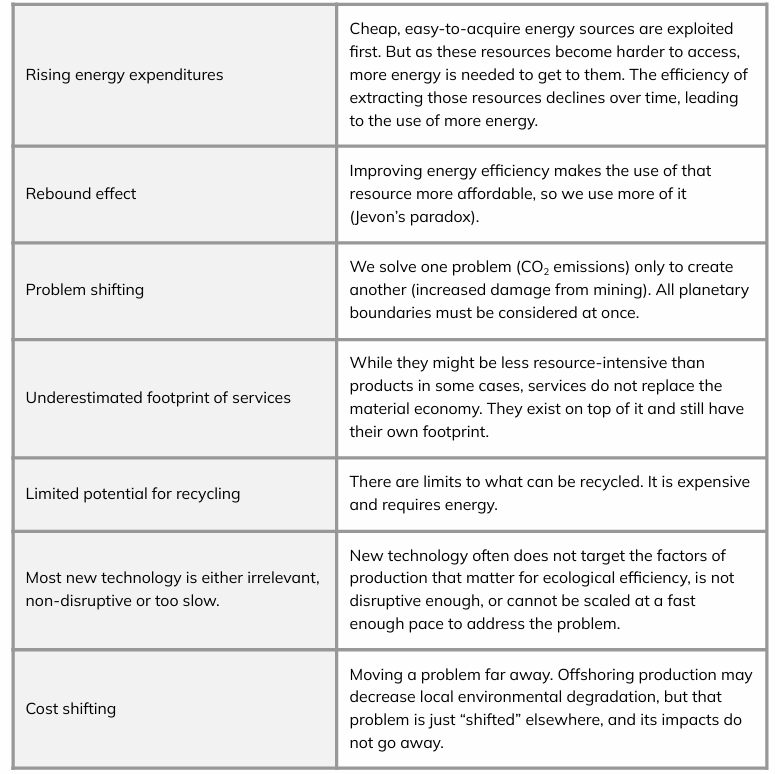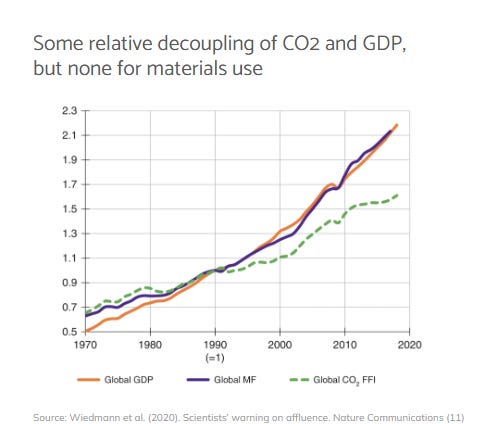Looks Like We Made It
They are coming for Degrowth. It's about time.
You know you are on to something when someone takes the time to write a whole book targeting something you believe in that challenges the status quo. We are at that point in the degrowth movement. To quote the great Barry Manilow; “Looks like we made it!”
I came across the blog post: RethinkX: Debunking Degrowth - by John Elkington here on Substack a few days ago. Elkington starts out by asking ChatGPT about sustainability, its shortcomings, the promises offered by degrowth and the arguments from those who do not agree with degrowth. All of this was pretty informative for the first part of Elkington’s post.
Then Elkington introduces us to the upcoming book whose main thesis he says he agrees with. The book is the upcoming The Degrowth Delusion: Dispelling One of History’s Truly Terrible Ideas. Below are some of the quotes Elkington pulls out from Dorr’s book, and my responses to them.
The Argument
Many of us have had the same nagging feeling in the back of our minds: degrowth is nonsense. We know it instinctively.
Of course this isn’t a good argument. Dorr is appealing to emotion and intuition here, signaling that he’s going to ignore evidence and data. Not a good start. When an author tells his audience that if they just feel something strongly, they are right, this tells us that he’s not going to bother with evidence. A good Aristotelian knows that you need to appear to all three of the triad: Ethos (credibility of the speaker), Pathos (Emotions), Logos (Logic). It’s all Pathos here. That’s not an intellectually compelling argument.
When someone tells us the solution to poverty is to make everyone poorer, alarm bells go off. When they claim the path to environmental sustainability requires dismantling the very systems that could deliver clean technologies at scale, our BS detectors start pinging. When they insist that human progress itself is the enemy, despite millennia of evidence to the contrary across every domain of concern, every fiber of our being rebels against such cynical and nihilistic rubbish.
As I’ve said before, Degrowth isn’t Austerity. Degrowth does emphasize less consumption and less material wealth at the top end of the economic scale for the overall health of society. Degrowth recognizes that the real limits to growth call for a reorienting of what we think of as a healthy society. More wealth is not that. More wealth in and of itself is not bad, but a culture that requires overproduction and overconsumption to the point of destroying its environment to achieve that wealth … that, my friend, is nihilistic rubbish.
If we take a degrowth path some people, mostly at the top of the wealth scale in developed countries will have less material wealth. The trade off is that you get better health, better society. The bogeyman is that “everyone will be poorer”. If all that matters to you in life is money, then yes degrowth is terrible. If you value health and ability for your society to continue operating, then that tradeoff is worth it.
Yes, we should deliver clean technologies at scale, but not to the extent they make the problem worse. Green growth is a myth.
We should of course embrace clean energy sources and use them when and where we can. Wind, solar, hydroelectric, geothermal and other non-fossil fuel energy sources are each relatively clean when compared to fossil fuels. The world is headed for a low-carbon future, and that is a good thing. It is an open question as to whether we get there fast enough to make enough of a difference. But we need to be honest with ourselves.
The idea behind green growth is that GDP growth is independent and can be “decoupled” from carbon emissions and material use. A 2019 European Environmental Bureau paper reviewed the empirical and theoretical literature on the reality of decoupling and came to the conclusion that there was no empirical evidence supporting the existence of decoupling of economic growth from environmental pressures on the scale needed to avoid environmental breakdown and that such decoupling seems unlikely in the time frame needed to avoid the worst of climate change. The authors of the report identify seven reasons why the hypothesis of decoupling fossil energy use from economic growth often fails.
To achieve true decoupling, each of these factors would have to be addressed. The authors note that from 1970 to 2010, the total material use at the global level has more than tripled, and the material intensity of GDP per capita has increased by 60% between 1900 and 2009. So even if carbon emissions and GDP could be decoupled, we currently have no reason to believe that material use and GDP could diverge.
Defining “human progress” as only wealth and material accumulation is the problem. Human progress is also science, philosophy, medicine, sanitation, education, and hundreds of other developments. Reducing it to only money and things we can consume more of is the problem. This is a cultural change. We can live here and be happy with less. We cannot live here and be happy with more. That is destroying us.
Engaging in academic debate about degrowth would mean descending into the most esoteric weeds from which the overwhelming majority of readers would glean no value. Parsing footnotes about planetary boundaries, debating the finer points of throughput accounting, and arguing about which metrics properly represent complex aggregations and floating signifiers like growth and wellbeing would obfuscate more than it would illuminate. These theatrics might impress a narrow subset of readers, but it would turn off the audience that matters most: the people actually making decisions that shape our collective future, whether in the halls of power, the c-suite, or all the rest of us in the day-to-day of our own lives.
You don’t want to talk about facts, because they don’t support you.
Some or even most of the commitments of the staunchest degrowth ideologues have nothing to do with concerns about humanity’s ecological footprint. The academic degrowth orthodoxy is unapologetic about its mission to overthrow capitalism and radically restructure society with draconian government controls. As in other totalizing cults, the cloak of ‘green’ virtue that degrowth ideologues so proudly wear is a means to other ends, not the primary end in itself.
Oh boy. I don’t care whether capitalism exists or not. But I know that it doesn’t work as currently practiced if we want a healthy society at all in the long-term. No draconian government controls. The societal levers that matter most should be local, community based and focus on resilience, regeneration and providing for the community. The draconian government control we have now is ensuring growth continues at all costs.
Degrowth simply does not merit an academic level of intellectual engagement. To treat it as a serious scientific proposition requiring careful scholarly refutation would be to grant it a legitimacy it does not deserve. Degrowth is trivially easy to debunk. Its fatal flaws are many and obvious to anyone willing to look. The real mystery isn’t why degrowth is wrong—it’s why so many smart people adhere to it despite its transparent absurdity.
When someone tells you to shut down your critical thinking - run away.
The solution to our rapidly evolving polycrisis, Adam argues, “isn’t to do less. It’s to do better. Degrowth stumbles right out of the gate because it fundamentally misunderstands what growth actually means. Growth is not about using more stuff. It is about creating more value. There are limits to physical stuff, but no meaningful limits to how much value we can create with the finite resources available to us here on Earth. This in turn means that degrowth fundamentally misunderstands technology.”
What does this mean? I’ve heard this argument many times. But “creating more value” always means more energy and more materials. If you can create more value without needing more energy and materials … show me how. It hasn’t been done yet on a global scale, but I have an open mind.
Superabundant clean energy and labor will allow us to solve virtually all of today’s environmental problems. Deforestation, desertification, habitat fragmentation and loss, overfishing, coral bleaching, eutrophication and hypoxic dead zones, ocean acidification, plastic pollution, biodiversity loss, endangered species, invasive species, air pollution, water pollution, soil erosion, soil contamination, and waste management—they will all become solvable over the next several decades.
...Even better still, the good news goes beyond just environmental challenges. These very same technologies will also help us achieve our social goals as well, because they are all massively democratizing and will smash existing geographic and socioeconomic barriers to human development. With clean superabundance, we can have prosperity for everyone, everywhere, without ecological harm. Humanity can thrive, and we can heal our planet at the same time.
How? There are no details here. Without details, this is just economist fan fiction. No thank you.
Our politics is tied up in growth. Yes, we want them to adopt a much wider vision of progress. But we have breached planetary boundaries, and that isn’t a detail that can be ignored. Our life support system is breaking down. Promising “more” isn’t the answer. Realizing that we have more than enough, is.





When are you going to stop avoiding the facts and admit that we don’t have a crisis that will require the debasement of our prosperity with your concept.
If the concept was called sustainability to improve our efficiency and effectiveness of planned support for prosperity that may work, but saying the next generation and the emerging world cannot have what we have is not only unethical it just wont happen.
Excellent job debunking this--and I think you're right in your initial point, that the book in question being written is an indication that degrowth is becoming mainstream.